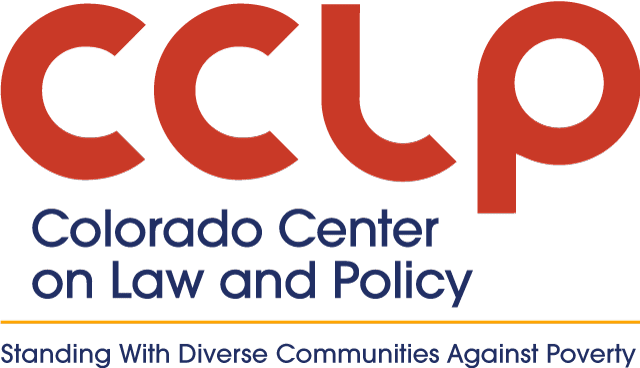Charles Brennan provided testimony in support of House Bill 24-1129, Protections for Delivery Network Company Drivers. CCLP is in support of HB24-1129.
Recent articles
CCLP testifies in support of TANF grant rule change
CCLP's Emeritus Advisor, Chaer Robert, provided written testimony in support of the CDHS rule on the COLA increase for TANF recipients. If the rule is adopted, the cost of living increase would go into effect on July 1, 2024.
CCLP testifies in support of updating protections for mobile home park residents
Charles Brennan provided testimony in support of House Bill 24-1294, Mobile Homes in Mobile Home Parks. CCLP is in support of HB24-1294.
CCLP’s legislative watch for April 5, 2024
For the 2024 legislative session, CCLP is keeping its eye on bills focused on expanding access to justice, removing administrative burden, preserving affordable communities, advocating for progressive tax and wage policies, and reducing health care costs.
Check out the new CCLP brand

With new leadership in place and a bold new direction at Colorado Center on Law and Policy taking shape over the past year, we decided it was also time for a new look to convey our mission, vision and values. Last summer, we began exploring some possibilities for developing a new brand identity that would reflect our work and our community in an authentic manner.
Though our connections, we became aware of an opportunity to collaborate with students at Metro State University of Denver in developing our new brand. Specifically, we reached out to Professor Martin Mendelsberg and his students in the Identity and Systems Design, Service Learning Design Class for the Fall Semester 2019. CCLP staff met with the students in this class on several occasions and shared information about our vision, mission and values. The students used this information to craft a creative cascade of innovative design ideas, and the strong identity that they saw in our work.
This opportunity to change some of our visual elements and brand colors was well timed; last August, we had begun a new process of organization-wide strategic planning. This effort resulted in updates to our vision, mission and core values. We also reorganized the structure of our organization to better reflect the nature of our work, highlighted by the new Legal Department and Legislative Department. In addition, we founded the Burnes Institute for Poverty Research at CCLP through the generosity of Don and Lynn Burnes.
Among our new core values is community engagement, whereby we hope to become a more attentive, responsive, and power-sharing organization with people in our Colorado communities. Working with the students in Professor Mendlesberg’s class last fall was a good reflection of those values, as the students brought many different perspectives from their own lived experiences to bear on the question of design and branding. We feel that this collaboration was truly valuable, and the final product is only one manifestation of that value. The process of designing and learning with these talented young people brought many things into focus for us on staff at CCLP, and we feel a strong sense of shared growth and learning with these students.
By the end of our work with the class, we had been able to view more than 90 options for different design and branding schemes. The work of narrowing and focusing was difficult indeed with so many wonderful options to choose from, but in the end one small group of students did indeed design the final look that our CCLP staff and board selected together. A special thanks to Madison Faulkner, Larissa Hill, and Eric Tofsted, whose design was selected for use. Their design evokes the colors of the Colorado flag, with a twist to make them distinct. On that basis, they designed three new colors: CCLP Orange, CCLP Blue, and CCLP Gold, that reflect the Colorado Flag palette that in turn reflects the natural beauty of our state. Look for our new colors and other design elements on our website, in our new logo, and in our many policy and research publications to come. We hope this vibrant and modern design scheme serves as an open door to people in Colorado to engage with us and our work.
– By Bruce Barnum





